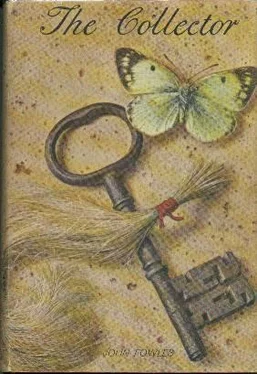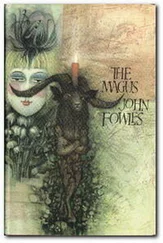It was a question. It shocked me.
It’s not that at all. I shall have all proper respect. I’m not that sort. I sounded quite curt.
“Then you must be mad,” she said. “In a nice kind way, of course.”
“You admit that the Mr. Singleton story is not true?”
I wanted to break it gently, I said.
“Break what?” she asked. “Rape? Murder?”
I never said that, I answered. She always seemed to get me on the defensive. In my dreams it was always the other way round.
“Why am I here?”
I want you to be my guest.
“Your guest!”
She stood up and walked round the armchair and leant against the back, eyes on me all the time. She’d taken her blue jumper off, she stood there in a dark green tartan dress, like a schoolgirl tunic, with a white blouse open at the throat. Her hair swept back into the pigtail. Her lovely face. She looked brave. I don’t know why, I thought of her sitting on my knees, very still, with me stroking her soft blonde hair, all out loose as I saw it after.
Suddenly I said, I love you. It’s driven me mad.
She said, “I see,” in a queer grave voice.
She didn’t look at me any more then.
I know it’s old-fashioned to say you love a woman, I never meant to do it then. In my dreams it was always we looked into each other’s eyes one day and then we kissed and nothing was said until after. A chap called Nobby in R.A.P.C. who knew all about women, always said you shouldn’t ever tell a woman you loved her. Even if you did. If you had to say “I love you,” you said it joking—he said that way it kept them after you. You had to play hard to get. The silly thing was I told myself a dozen times before I mustn’t tell her I loved her, but let it come naturally on both sides. But when I had her there my head went round and I often said things I didn’t mean to.
I don’t mean I told her everything. I told her about working in the Annexe and seeing her and thinking about her and the way she behaved and walked and all she’d meant to me and then having money and knowing she’d never look at me in spite of it and being lonely. When I stopped she was sitting on the bed looking at the carpet. We didn’t speak for what seemed a long time. There was just the whir of the fan in the outer cellar.
I felt ashamed. All red.
“Do you think you’ll make me love you by keeping me prisoner?”
I want you to get to know me.
“As long as I’m here you’ll just be a kidnapper to me. You know that?”
I got up. I didn’t want to be with her any more.
“Wait,” she said, coming towards me, “I’ll make a promise. I understand. Really. Let me go. I’ll tell no one, and nothing will happen.”
It was the first time she’d given me a kind look. She was saying, trust me, plain as words. A little smile round her eyes, looking up at me. All eager.
“You could. We could be friends. I could help you.”
Looking up at me there.
“It’s not too late.”
I couldn’t say what I felt, I just had to leave her; she was really hurting me. So I closed the door and left her. I didn’t even say good night.
No one will understand, they will think I was just after her for the obvious. Sometimes when I looked at the books before she came, it was what I thought, or I didn’t know. Only when she came it was all different, I didn’t think about the books or about her posing, things like that disgusted me, it was because I knew they would disgust her too. There was something so nice about her you had to be nice too, you could see she sort of expected it. I mean having her real made other things seem nasty. She was not like some woman you don’t respect so you don’t care what you do, you respected her and you had to be very careful.
I didn’t sleep much that night, because I was shocked the way things had gone, my telling her so much the very first day and how she made me seem a fool. There were moments when I thought I’d have to go down and drive her back to London like she wanted. I could go abroad. But then I thought of her face and the way her pigtail hung down a bit sideways and twisted and how she stood and walked and her lovely clear eyes. I knew I couldn’t do it.
After breakfast—that morning she ate a bit of cereal and had some coffee, when we didn’t speak at all—she was up and dressed, but the bed had been made differently from at first so she must have slept in it. Anyhow she stopped me when I was going out.
“I’d like to talk with you.” I stopped.
“Sit down,” she said. I sat down on the chair by the steps down.
“Look, this is mad. If you love me in any real sense of the word love you can’t want to keep me here. You can see I’m miserable. The air, I can’t breathe at nights, I’ve woken up with a headache. I should die if you kept me here long.” She looked really concerned.
It won’t be very long. I promise.
She got up and stood by the chest of drawers, and stared at me.
“What’s your name?” she said.
Clegg, I answered.
“Your first name?”
Ferdinand.
She gave me a quick sharp look.
“That’s not true,” she said. I remembered I had my wallet in my coat with my initials in gold I’d bought and I showed it. She wasn’t to know F stood for Frederick. I’ve always liked Ferdinand, it’s funny, even before I knew her. There’s something foreign and distinguished about it. Uncle Dick used to call me it sometimes, joking. Lord Ferdinand Clegg, Marquis of Bugs, he used to say.
It’s just a coincidence, I said.
“I suppose people call you Ferdie. Or Ferd.”
Always Ferdinand.
“Look, Ferdinand, I don’t know what you see in me. I don’t know why you’re in love with me. Perhaps I could fall in love with you somewhere else. I . . .” she didn’t seem to know what to say, which was unusual “. . . I do like gentle, kind men. But I couldn’t possibly fall in love with you in this room, I couldn’t fall in love with anyone here. Ever.”
I answered, I just want to get to know you.
All the time she was sitting on the chest of drawers, watching me to see what effect the things she said had. So I was suspicious. I knew it was a test.
“But you can’t kidnap people just to get to know them!”
I want to know you very much. I wouldn’t have a chance in London. I’m not clever and all that. Not your class. You wouldn’t be seen dead with me in London.
“That’s not fair. I’m not a snob. I hate snobs. I don’t pre-judge people.”
I’m not blaming you, I said.
“I hate snobbism.” She was quite violent. She had a way of saying some words very strong, very emphatic. “Some of my best friends in London are—well, what some people call working class. In origin. We just don’t think about it.”
Like Peter Catesby, I said. (That was the young man with the sports car’s name.)
“Him! I haven’t seen him for months. He’s just a middle-class suburban oaf.”
I could still see her climbing into his flashy M.G. I didn’t know whether to trust her.
“I suppose it’s in all the papers.”
I haven’t looked.
“You might go to prison for years.”
Be worth it. Be worth going for life, I said.
“I promise, I swear that if you let me go I will not tell anyone. I’ll tell them all some story. I will arrange to meet you as often as you like, as often as I can when I’m not working. Nobody will ever know about this except us.”
I can’t, I said. Not now. I felt like a cruel king, her appealing like she did.
“If you let me go now I shall begin to admire you. I shall think, he had me at his mercy, but he was chivalrous, he behaved like a real gentleman.”
I can’t, I said. Don’t ask. Please don’t ask.
Читать дальше












